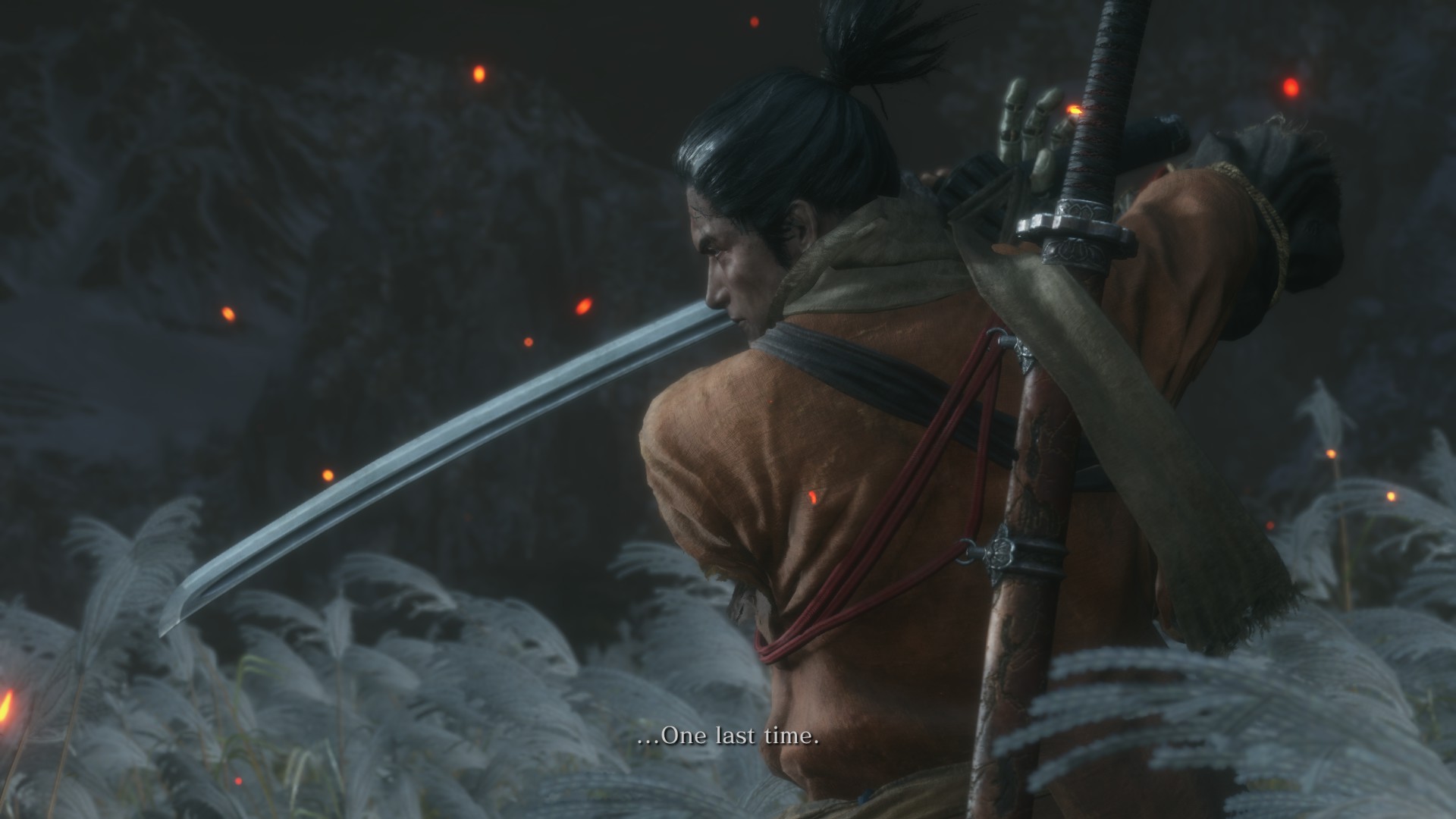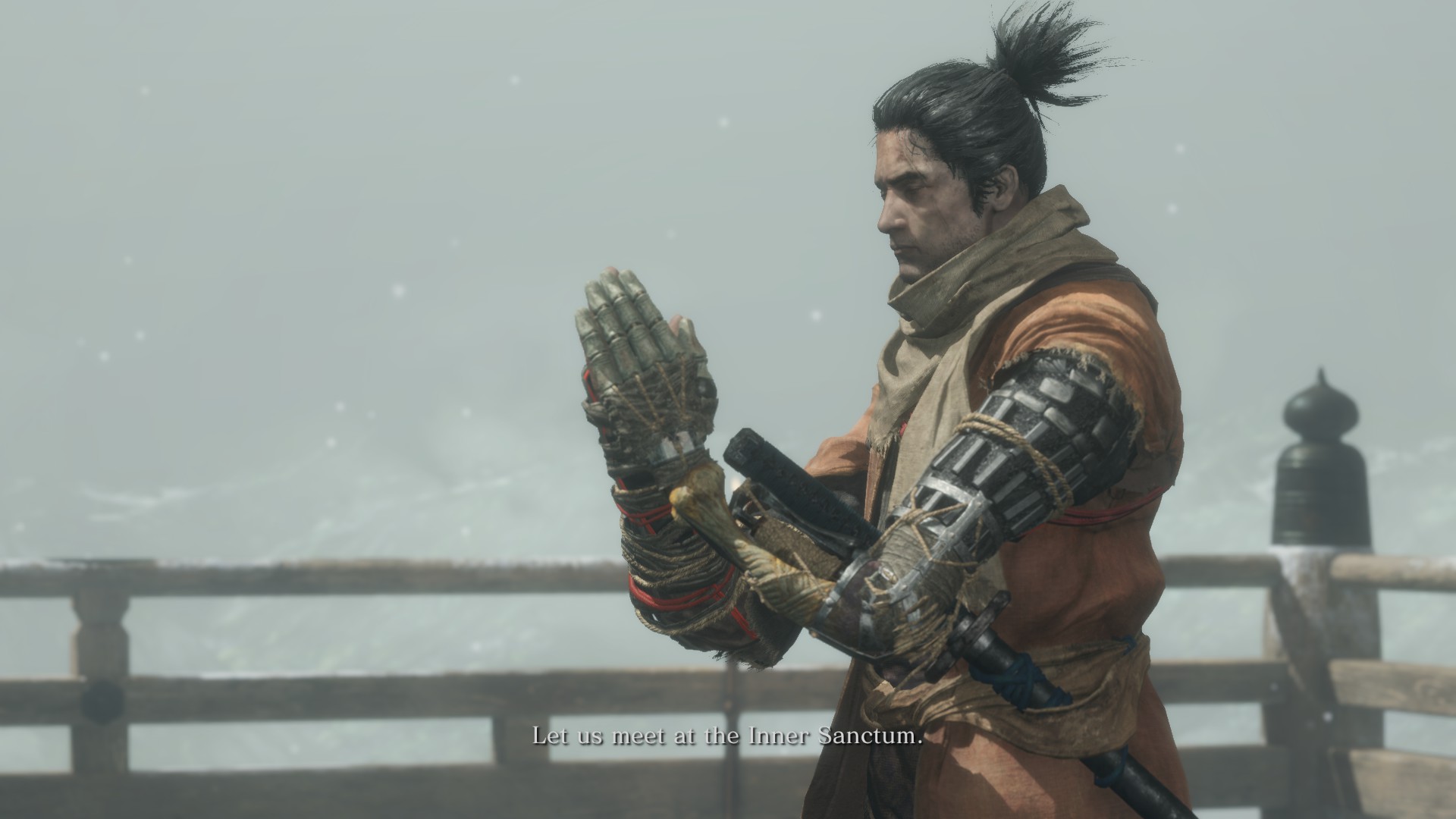Sekiro has ruined all other singleplayer games for me
From Software's shinobi action game has permanently changed my tastes, and even pushed me towards competitive multiplayer.

There's a sword fight at the start of Sekiro: Shadows Die Twice that serves two functions, depending on whether you're on your first or second playthrough. In the cutscene that follows this encounter, you always lose this battle and the story begins. But in-game, you can actually win the one-on-one duel with the main antagonist.
On your first try you're certain to fail, since you know very little about Sekiro's combat system and your opponent is bewilderingly fast and deadly. On your second try, though, during New Game+, it's a pretty easy fight to win, because at this point the rhythm of Sekiro's combat has become deeply ingrained. The rush of that win kicked off my obsession with Sekiro last year—and made every singleplayer game I've touched since feel dull by comparison.
Pushing through the pain barrier was the rewarding experience I'd heard about from Bloodborne or Souls players, yet never had myself
Offering two outcomes at this moment makes a deliberate point: At the start of your second run you're closing the loop on your first playthrough by bullying the same boss who annihilated you when the game started 30 hours ago. It's celebrating your mastery of a bastard-hard combat system and sets you up for a second playthrough where you can confidently steamroller your enemies. NG+ is really the second half of Sekiro.
It's 2020, and I'm now on playthrough three or four. I don't remember which, such was the obsessive fever dream nature of my 82-hour blitz with Sekiro last spring. I've gone back to Shadows Die Twice after browsing my screenshot folder on Steam, which reminded me of all the cool, weird shit the game throws at players: Giant white snakes screaming in valleys, men in pots who want to transform into fish and friendly, kimono-wearing monkeys who guard the spirits of children (until you cruelly hunt the monkeys down to advance the story).
Sekiro is a masterpiece. It's resolutely not for everyone, but pushing myself through the game's pain barrier was the kind of rewarding experience I'd heard about from Bloodborne or Souls players, yet never had myself. Unfortunately, it's also caused a schism in my relationship with singleplayer games. It's led me to instead seek out games that provide a similar buzz for mastering them, and away from the sort of solo experiences I exclusively enjoyed just a couple of years ago.
Sekiro's melee combat is the thing that spoiled me. It hits the same part of my brain that the later Jedi Knight games did in the '00s—the hunger for meaningful one-on-one cinematic duels with deadly opponents. In Sekiro, enemies usually kill you in two or three hits, so every parry, slash or dodge matters. It's incredibly exciting once you understand the dynamics of it, but it's also the kind of combat system you'll likely never see replicated wholly in other games, simply because the stakes are too high for most players.
Blockbuster singleplayer games don't really demand mastery in the same way. It's hard to be good at the combat in Assassin's Creed Odyssey, for example, because the game is so heavily gated by RPG-style levels that you can't meaningfully take on a boss who's too hard for you—they'll find arbitrary ways to kill you. There's some skill in staying alive and killing enemies on your level, sure, but I couldn't tell you why one fight in a recent Assassin's Creed game was better than another. All of Sekiro's bosses are meaningfully different—each represents a pocket of failed attempts that collectively tell a great story of your success as a player.
The biggest gaming news, reviews and hardware deals
Keep up to date with the most important stories and the best deals, as picked by the PC Gamer team.
I've only finished three singleplayer games in the 15 months since I first beat Sekiro, which is extremely low for me. I've still played a lot of cool stuff in that time, like Slay the Spire and The Outer Worlds, but during a good year I'll usually finish 20-30 games. I keep yearning for that same challenge and satisfaction and coming up empty.
So I turned to competitive multiplayer instead—and found exactly what I was looking for.

Chasing mastery
Aside from a long, torrid affair with Rocket League, I'm not really a multiplayer guy. When people were worrying about the death of singleplayer games in 2016 or so, I was one of them. I remember thinking 'but why?' when Gearbox made Battleborn instead of another Borderlands.
Turning to multiplayer after Sekiro made sense for me, though. It wasn't just the sword combat I was addicted to—it was the feeling of truly understanding what I needed to be doing every second, and having the reflexes to pull it off. Competitive multiplayer has started to fill that void.
The adrenaline rush I got from beating a boss like Genichiro Ashina in Sekiro is now something I only really get from shotgunning five players in the face during an energetic round of Apex Legends. Those fireworks going off in my brain come from a growing sense of achievement—that competitive feeling I usually tried to bury away. Sekiro invited me to embrace that part of playing games in a way I'd always avoided by playing comparatively gentle solo experiences.
Open world games tend to be overloaded with things to do, and you're so in control of your environment, it's hard to get stuck without some way to progress. It removes frustration, but robs them of dramatic peaks and valleys as a result. That used to be perfectly enjoyable to me—but that's the specific thing that I'm convinced Sekiro has broken in my brain. I now need higher highs, and lower lows. Multiplayer gives them to me, even though tense, demanding shooters like Apex are the types of games I hated just a few years ago.
This has undeniably been good for me, though—and I'd encourage anyone to reach outside of the genres they like to see what might click. Pushing outside your comfort zone might unlock parts of your player brain you didn't even know were there.
Sekiro forced me to confront my true competitive, petty and tantrum-throwing self. I now need the buzz from achieving something, even if what I'm actually doing—playing first-person shooters in my underpants—cannot be called an achievement by any real-world metrics.


